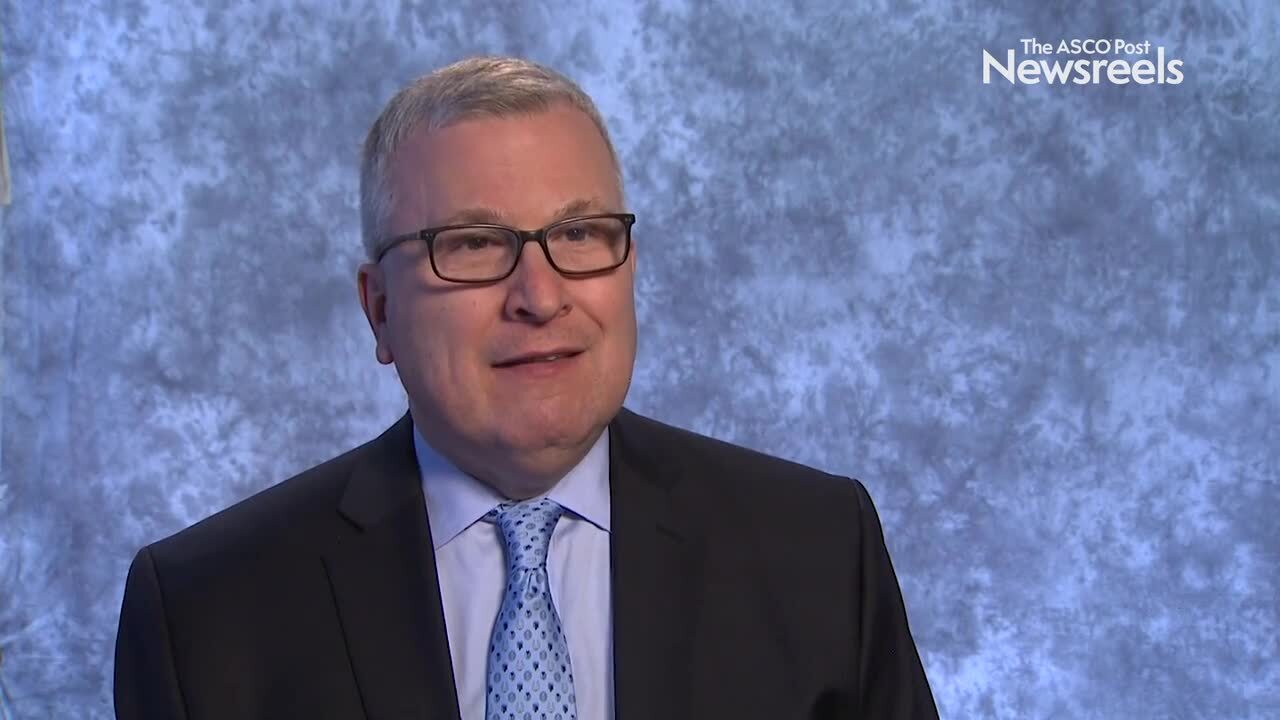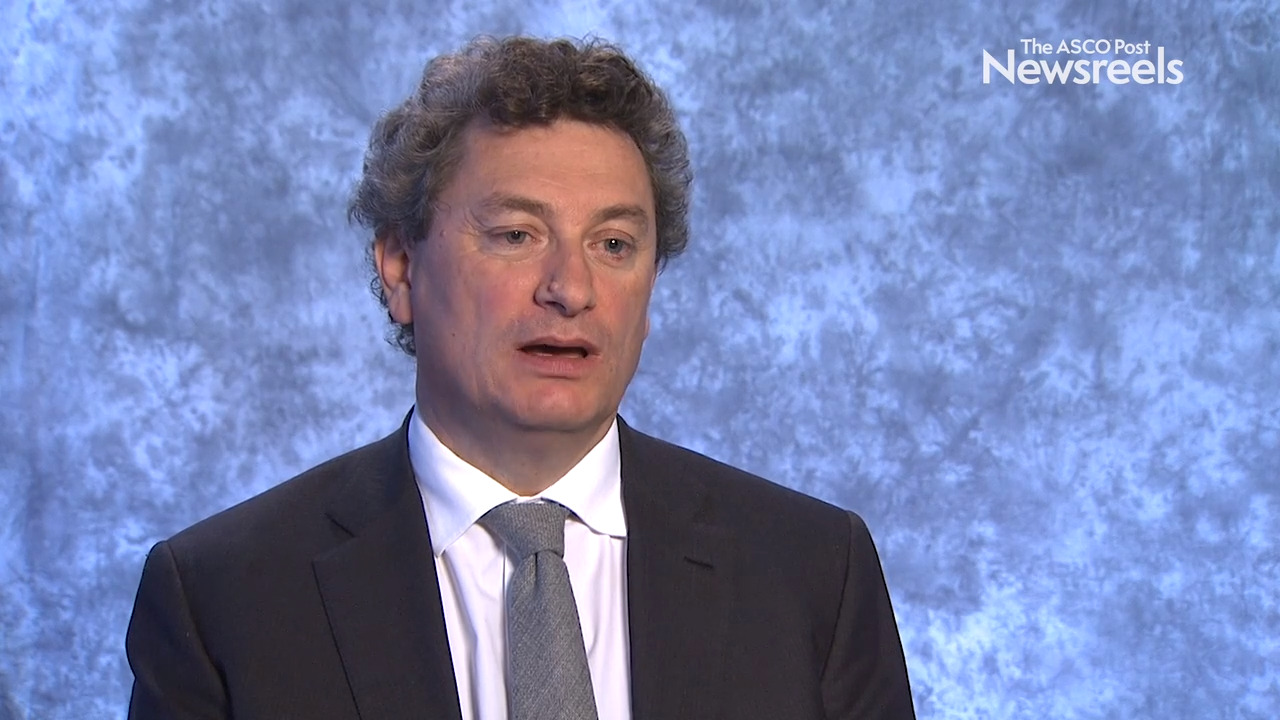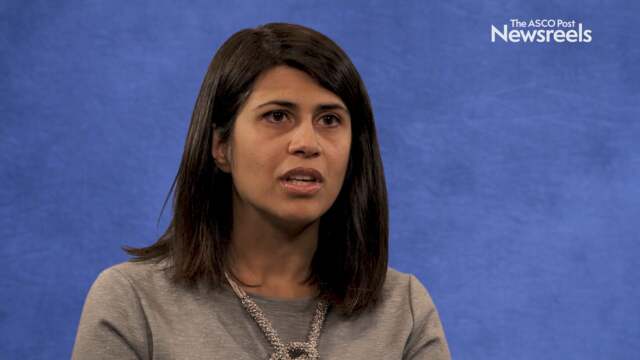John P. Leonard, MD, on NHL: Results From the AUGMENT Trial
John P. Leonard, MD, of Weill Cornell Medicine/Cornell University, discusses phase III findings on lenalidomide plus rituximab vs rituximab plus placebo for people with relapsed or refractory indolent non-Hodgkin lymphoma (Abstract 445).
ASH 2018: Update of ZUMA-1: Axicabtagene Ciloleucel in DLBCL
A follow-up analysis of patients enrolled in the multicenter ZUMA-1 trial for diffuse large B-cell lymphoma (DLBCL) showed axicabtagene ciloleucel can induce durable responses, yield a median overall survival of more than 2 years, and has a manageable long-term safety profile. Axicabtagene...
Gilles A. Salles, MD, PhD, on DLBCL: Results From the L-Mind Treatment Trial
Gilles A. Salles, MD, PhD, of Centre Hospitalier Lyon Sud, discusses trial findings on the monoclonal antibody MOR208 combined with lenalidomide in people with relapsed or refractory diffuse large B-cell lymphoma (Abstract 227).
ASH 2018: Four vs Six Cycles of Chemotherapy in Diffuse Large B-Cell Lymphoma
A new study suggests that it may be safet to reduce the standard course of treatment for younger patients with low-risk diffuse large B-cell lymphoma (DLBCL) by two cycles of chemotherapy. The trial, which tracked patients for a median of more than 5 years and up to 11 years, showed 4 cycles of...
ASH 2018: Updated Analysis of JULIET Trial: Tisagenlecleucel in Relapsed or Refractory DLBCL
In an update to the global JULIET clinical trial, the chimeric antigen receptor (CAR) T-cell therapy tisagenlecleucel (Kymriah) led to long-lasting remissions in patients with relapsed or refractory diffuse large B-cell lymphoma (DLBCL). The most recent results from the trial were presented by...
First Rituximab Biosimilar for Non-Hodgkin Lymphoma Approved by FDA
Today, the U.S. Food and Drug Administration (FDA) approved rituximab-abbs (Truxima) as the first biosimilar to rituximab (Rituxan) for the treatment of adult patients with CD20-positive, B-cell non-Hodgkin lymphoma to be used as a single agent or in combination with chemotherapy. Rituximab-abbs is ...
FDA Expands Approved Use of Brentuximab Vedotin in Some Types of PTCL
ON NOVEMBER 16, 2018, the U.S. Food and Drug Administration (FDA) expanded the approved use of brentuximab vedotin (Adcetris) injection in combination with chemotherapy for adult patients with certain types of peripheral T-cell lymphoma (PTCL)—adults with previously untreated systemic anaplastic...
Duvelisib vs Ofatumumab in Relapsed or Refractory CLL/SLL
As reported in Blood by Ian W. Flinn, MD, PhD, Director of the Lymphoma Research Program at Sarah Cannon Research Institute, and colleagues, the phase III DUO trial has shown significantly prolonged progression-free survival with the phosphoinositide 3-kinase (PI3K)-δ/γ inhibitor duvelisib...
Leukemia & Lymphoma Society Receives Funding for New Grants
The Leukemia & Lymphoma Society recently announced a $1,175,000 commitment by the Schwartz Ward Family Foundation of Chicago to support two research initiatives. These funds will support two grants in the society’s Career Development Program: Christiane Querfeld, MD, PhD, of City of Hope, is...
FDA Expands Approved Use of Brentuximab Vedotin in Some Types of PTCL
Today, the U.S. Food and Drug Administration (FDA) expanded the approved use of brentuximab vedotin (Adcetris) injection in combination with chemotherapy for adult patients with certain types of peripheral T-cell lymphoma (PTCL)—adults with previously untreated systemic anaplastic large cell...
FDA Pipeline: What’s New in Biosimilars, Drug Reviews, Designations, and More
The U.S. Food and Drug Administration (FDA) recently issued the following new approvals and designations: Approval for Pegfilgrastim Biosimilar The FDA recently approved a pegfilgrastim biosimilar, pegfilgrastim-cbqv (Udenyca). The biosimilar has been approved to decrease the incidence...
Venetoclax for CLL or SLL With or Without 17p Deletion After Prior Therapy
On June 8, 2018, venetoclax (Venclexta) was granted regular approval for treatment of patients with chronic lymphocytic leukemia (CLL) or small lymphocytic lymphoma (SLL), with or without 17p deletion, who have received at least one prior therapy.1,2 Supporting Efficacy Data APPROVAL WAS BASED on ...
Combination of Macrophage Immune Checkpoint Inhibitor and Rituximab in Non-Hodgkin Lymphoma
In a phase Ib study reported in The New England Journal of Medicine, Advani et al found that the combination of rituximab (Rituxan) and the CD47-blocking monoclonal antibody Hu5F9-G4 (or 5F9), a macrophage immune checkpoint inhibitor, was active in patients with non-Hodgkin lymphoma. CD47, which is ...
Final Overall Survival Results for First-Line VR-CAP vs R-CHOP in Transplantation-Ineligible Mantle Cell Lymphoma
In an analysis reported in The Lancet Oncology by Robak et al, bortezomib, rituximab [Rituxan], cyclophosphamide, doxorubicin, and prednisone (VR-CAP) significantly prolonged overall survival vs rituximab, cyclophosphamide, doxorubicin, vincristine, and prednisone (R-CHOP) in a phase III trial ...
Risk Factors for Higher-Grade Transformation in Marginal Zone Lymphoma
In a single-institution study reported in the Journal of Clinical Oncology, Alderuccio et al found that not achieving complete remission (CR) after initial treatment, elevated lactate dehydrogenase (LDH), and more than four nodal sites at marginal zone lymphoma diagnosis are predictive of...
Cost-Effectiveness of First-Line Brentuximab Vedotin Plus Chemotherapy in Hodgkin Lymphoma
In a cost-effectiveness analysis reported in the Journal of Clinical Oncology, Huntington et al found that the cost of brentuximab vedotin (Adcetris) would need to be reduced in order for the combination of the agent with chemotherapy in first-line treatment of stage III or IV Hodgkin lymphoma to...
Analysis of Prognostic Value of Postinduction PET Response After First-Line Immunochemotherapy for Follicular Lymphoma
In an analysis of the phase III GALLIUM trial reported in The Lancet Oncology, Trotman et al found that end-of-induction fluorodeoxyglucose positron-emission tomography (PET) after first-line immunochemotherapy appeared to better predict treatment outcomes than contrast-enhanced computed tomography ...
Novel Treatment Approaches in Early Relapse of Follicular Lymphoma
“Patients with follicular lymphoma who relapse early after treatment are a minority of patients, fortunately, but they are clearly patients with a different disease,” according to Jonathon B. Cohen, MD, of Emory University School of Medicine. At Emory’s 2018 Debates and Didactics in Hematology and...
Chemotherapy-Free Initial Treatment of Advanced Indolent Lymphoma
In an analysis of two Nordic Lymphoma Group trials with long-term follow up reported in the Journal of Clinical Oncology, Lockmer and colleagues found evidence that many patients receiving rituximab (Rituxan) as initial treatment for advanced indolent lymphoma may not require the addition of...
Duvelisib vs Ofatumumab in Relapsed or Refractory CLL/SLL
As reported in the journal Blood by Flinn et al, the phase III DUO trial has shown significantly prolonged progression-free survival with the phosphoinositide 3-kinase (PI3K)-δ,-γ inhibitor duvelisib (Copiktra) vs ofatumumab (Arzerra) in patients with relapsed or refractory chronic...
FDA Approves Duvelisib for Adult Patients With Relapsed or Refractory Hematologic Malignancies
ON SEPTEMBER 24, 2018, the U.S. Food and Drug Administration (FDA) granted regular approval to duvelisib (Copiktra) for adults with relapsed or refractory chronic lymphocytic leukemia (CLL) or small lymphocytic lymphoma (SLL) after at least two prior therapies. Duvelisib also received accelerated...
Results From ECHELON-2: Brentuximab Vedotin in CD30-Expressing Peripheral T-Cell Lymphoma
The phase III ECHELON-2 clinical trial has met its primary endpoint, demonstrating a statistically significant improvement in progression-free survival (PFS) with brentuximab vedotin (Adcetris) in combination with CHP (cyclophosphamide, doxorubicin, prednisone) vs CHOP (cyclophosphamide,...
In Vitro and Ex Vivo Activity of Gentian Violet in Cutaneous T-Cell Lymphoma
As reported in JAMA Dermatology, Wu and Wood found that the widely available nonprescription topical antimicrobial agent gentian violet has potent activity against cutaneous T-cell lymphoma (CTCL) in studies in vitro and ex vivo. The study involved high-throughput small molecule screening of 1,710...
ASCP, CAP, and ASH Invite Public Comment on Lymphoma Guideline
With a focus on the pathology aspects of diagnosing lymphoma, the American Society for Clinical Pathology (ASCP), the College of American Pathologists (CAP), and the American Society of Hematology (ASH) are collaborating to develop an evidence-based clinical practice guideline for the workup of...
Ovarian Function After Response-Adapted Treatment in Younger Women With Advanced Hodgkin Lymphoma
In a secondary analysis of the UK phase III RATHL trial reported in The Lancet Oncology, Anderson et al found that ovarian function recovery was affected by age and type of response-adapted therapy in women receiving treatment for advanced Hodgkin lymphoma. The analysis included 67 eligible...
Mogamulizumab-kpkc for Mycosis Fungoides and Sézary Syndrome
On August 8, 2018, the CC chemokine receptor type 4 (CCR4)-directed monoclonal antibody mogamulizumab-kpkc (Poteligeo) was approved for adult patients with relapsed or refractory mycosis fungoides or Sézary syndrome after at least one prior systemic therapy.1,2 Supporting Efficacy Data The current...
Targeting CCR4 in Cutaneous T-Cell Lymphoma: The MAVORIC Trial
The C-C chemokine receptor 4 (CCR4) is predominantly expressed in type 2 helper T (Th2) cells and regulatory T (Treg) cells.1 Under physiologic conditions and in response to its ligands, CCL17 (TARC) and CCL22 (MDC), CCR4 promotes T-cell migration to the skin.2 Of note, CCR4 is highly expressed in...
Mogamulizumab Improves Progression-Free Survival vs Vorinostat in Cutaneous T-Cell Lymphoma
As reported by Youn H. Kim, MD, of Stanford Cancer Institute, Stanford University School of Medicine, and colleagues in The Lancet Oncology, the phase III MAVORIC trial showed that the anti-C-C chemokine receptor 4 (CCR4) monoclonal antibody mogamulizumab (Poteligeo) significantly improved...
Rituximab/Lenalidomide vs Rituximab/Chemotherapy in Advanced Untreated Follicular Lymphoma
In the phase III RELEVANCE trial reported in The New England Journal of Medicine by Franck Morschhauser, MD, PhD, of The University of Lille, Centre Hospitalier Universitaire Lille, France, and colleagues, no difference in the complete response rate or interim progression-free survival was found...
The Relevance of the RELEVANCE Trial in Follicular Lymphoma
We have seen remarkable progress in the outcomes of patients with advanced-stage follicular lymphoma over the past 2 decades.1 Recent manuscripts and presentations describing long-term follow-up of randomized trials comparing various chemotherapy platforms (all combined with anti-CD20 antibodies)...
Reem Karmali, MD, on Lymphomas and CAR T-Cell Therapy
Reem Karmali, MD, of the Robert H. Lurie Comprehensive Cancer Center of Northwestern University, discusses CAR T-cell therapy for relapsed/refractory DLBCL and other subtypes of lymphomas, ways to manage toxicities, and how to integrate this treatment into care plans.
FDA Approves Duvelisib for Adult Patients With Relapsed or Refractory CLL, SLL, and Follicular Lymphoma
On September 24, 2018, the U.S. Food and Drug Administration (FDA) granted regular approval to duvelisib (Copiktra) for adult patients with relapsed or refractory chronic lymphocytic leukemia (CLL) or small lymphocytic lymphoma (SLL) after at least two prior therapies. In addition, duvelisib...
Pembrolizumab in Relapsed or Refractory Primary Mediastinal Large B-Cell Lymphoma
In the Clinic provides overviews of novel oncology agents, addressing indications, mechanisms of action, administration recommendations, safety profiles, and other essential information needed for the appropriate clinical use of these drugs. On June 13, 2018, pembrolizumab (Keytruda) was granted...
Rituximab/Lenalidomide vs Rituximab/Chemotherapy in Advanced Untreated Follicular Lymphoma
In a phase III RELEVANCE trial reported in The New England Journal of Medicine by Morschhauser et al, no difference in complete response rate or interim progression-free survival was found between rituximab [Rituxan]/lenalidomide [Revlimid] vs rituximab/chemotherapy in newly diagnosed advanced...
Sequential Brentuximab Vedotin and AVD in Older Patients With Newly Diagnosed Hodgkin Lymphoma
In a phase II study reported in the Journal of Clinical Oncology, Evens et al found that a regimen of brentuximab vedotin (Adcetris) given sequentially before and after standard doxorubicin, vinblastine, and dacarbazine (AVD) was associated with good outcomes in untreated older patients with...
Challenges of Managing Older Patients With Diffuse Large B-Cell Lymphoma
As the population continues to age, the interplay between aging and cancer increasingly shows cancer to be a disease of older people. By the year 2030, there will be an increased incidence of non-Hodgkin lymphoma (NHL) in older individuals.1 The median age of patients diagnosed with diffuse large...
Clarifying the Complexity of Genomic Testing in Non-Hodgkin Lymphoma
AS MORE is learned about the genomic landscape in non-Hodgkin lymphoma, clinicians are grappling with how to apply this information in the clinic. At the 2018 Pan Pacific Lymphoma Conference, Andrew D. Zelenetz, MD, PhD, helped them understand this emerging area.1 Dr. Zelenetz is Professor of...
Relapsed or Refractory Hodgkin Lymphoma: Optimizing Salvage Therapy
As novel therapies come on board for treating relapsed or refractory Hodgkin lymphoma, the field is advancing toward more personalized therapy. The goal, even in the advanced-disease setting, is to increase the chances of complete response and negative positron-emission tomography (PET), while...
A Story of a Mother and Daughter and Cancer
BOOKMARK Title: The Cookie Cure: A Mother-Daughter Memoir of Cookies and CancerAuthors: Susan Stachler With Laura StachlerPublisher: SourcebooksPublication date: February 2018Price: $19.95, paperback, 320 pages Cancer memoirs vary in their voice and message. Some are slapstick humorous attempts to ...
Brentuximab Vedotin Plus Gemcitabine in Pediatric and Young Adult Patients With Relapsed/Refractory Hodgkin Lymphoma
In a Children’s Oncology Group phase I/II trial reported in The Lancet Oncology, Cole et al found that the combination of brentuximab vedotin (Adcetris) and gemcitabine was active in pediatric and young adult patients with relapsed or refractory Hodgkin lymphoma. As noted by the...
ctDNA and Treatment Outcome in Diffuse Large B-Cell Lymphoma
In a study reported in the Journal of Clinical Oncology, Kurtz et al found that baseline circulating tumor DNA (ctDNA) and molecular response to treatment were independent predictors of treatment outcome in diffuse large B-cell lymphoma. Study Details The association of ctDNA with treatment...
CAR T-Cell Therapy in Europe: Differing Decisions on Approval of Two Agents
The European Commission (EC) recently approved the chimeric antigen receptor (CAR) T-cell therapy tisagenlecleucel (Kymriah) in the European Union (EU) for the treatment of pediatric and young adult patients up to 25 years of age with B-cell acute lymphoblastic leukemia (ALL) that is...
FDA Approves Ibrutinib Plus Rituximab for Waldenström’s Macroglobulinemia
The U.S. Food and Drug Administration (FDA) has approved ibrutinib (Imbruvica) plus rituximab (Rituxan) for the treatment of adult patients with Waldenström's macroglobulinemia (WM). With this approval, the ibrutinib prescribing information now includes combination use with rituximab,...
Mogamulizumab vs Vorinostat in Previously Treated Cutaneous T-Cell Lymphoma
As reported by Kim and colleagues in The Lancet Oncology, the phase III MAVORIC trial showed that the anti-C-C chemokine receptor 4 (CCR4) monoclonal antibody mogamulizumab (Poteligeo) significantly improved progression-free survival vs vorinostat (Zolinza) among patients with previously treated...
FDA Grants Orphan Drug Designation to CPI-613 for the Treatment of Peripheral T-Cell Lymphoma
The U.S. Food and Drug Administration (FDA) has granted Orphan Drug designation to CPI-613 for the treatment of peripheral T-cell lymphoma. CPI-613 is a novel lipoic acid analog with an anticancer activity that inhibits multiple enzyme targets within the tricarboxylic acid cycle. This drug is...
FDA Approves Mogamulizumab-kpkc for Two Rare Types of Non-Hodgkin Lymphoma
On August 8, the U.S. Food and Drug Administration approved mogamulizumab-kpkc (Poteligeo) injection for intravenous use in the treatment of adult patients with relapsed or refractory mycosis fungoides or Sézary syndrome after at least one prior systemic therapy. This approval provides a new...
Venetoclax and Beyond: Successfully Targeting BCL2
Although many agents have been able to successfully inhibit the proliferative capacity of cancer cells or disable mutations that spur cancer growth, one area that has proven elusive is the apoptotic pathway—the cell’s means of resisting death. That is until recently. Dysregulation of B-cell...
For Hodgkin Lymphoma, PD-1 Blockade Is Not the Final Answer
Although programmed cell death protein 1 (PD-1) blockade is highly effective in Hodgkin lymphoma, not all patients respond, and not all responses are durable. Stephen M. Ansell, MD, PhD, Chair of the Mayo Clinic Lymphoma Group and Professor of Medicine at the Mayo Clinic, Rochester, described...
FDA Approves Mogamulizumab-kpkc for Two Rare Types of Non-Hodgkin Lymphoma
Today, the U.S. Food and Drug Administration approved mogamulizumab-kpkc (Poteligeo) injection for intravenous use for the treatment of adult patients with relapsed or refractory mycosis fungoides or Sézary syndrome after at least one prior systemic therapy. This approval provides a new...
More Antibody-Drug Conjugates Expected to Impact Treatment of Lymphoma
FOR THE TREATMENT of lymphoma, antibody-drug conjugates (ADCs) are becoming an important class of drugs, as described at the 2018 Pan Pacific Lymphoma Conference by Brad Kahl, MD, Professor of Medicine at Washington University School of Medicine, St. Louis.1 “We have one ADC—brentuximab vedotin...



